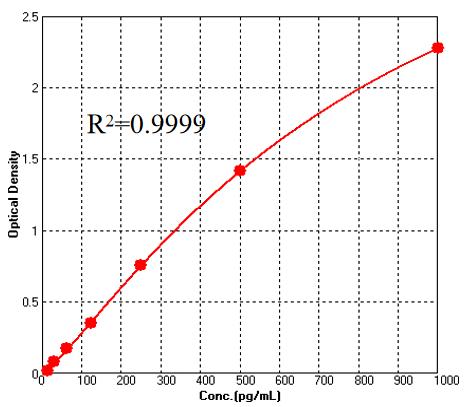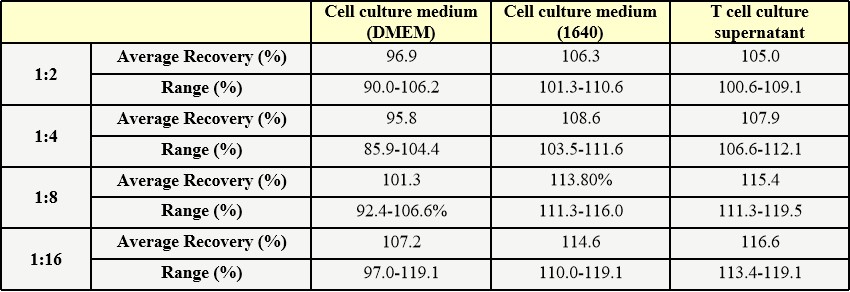产品描述(Product Details)
| Assay Type | Sandwich-ELISA |
| Analyte | SCF |
| Format | 96T(8×12 strips) |
| Reactivity | Human |
| Regulatory Status | RUO |
| Sensitivity | <15.625 pg/mL |
| Standard Curve Range | 15.625 pg/mL-1000 pg/mL |
| Assay Time | 2 hr 50 min |
| Suitable Sample Type | For the detection and quantitative determination of GMP human SCF in human serum and cell culture supernates. |
| Sample volume | 100 uL |
背景(Background)
Human SCF ELISA Kit is based on ELISA sandwich method and designed to measure human SCF levels in cell culture supernates, serum, and plasma. It contains recombinant human SCF and a pair of antibodies against the recombinant human SCF, which are provided by ACROBiosystems. Results are obtained by four parameter logistic curve that were parallel to the standard curves obtained. The verification results indicate that this kit can be used for the quantitative determination of GMP human SCF (ACROBiosystems, cat#GMP-SCFH25) concentrations. The specificity has been verified.
应用说明(Application)
The kit is developed for the detection and quantitative determination of GMP human SCF in human serum and cell culture supernates.
It is for research use only.
重构方法(Reconstitution)
Please see Certificate of Analysis for details of reconstitution instruction and specific concentration.
存储(Storage)
1. Unopened kit should be stored at 2℃-8℃ upon receiving.
2. Find the expiration date on the outside packaging and do not use reagents past their expiration date.
3. The opened kit should be stored per components table. The shelf life is 30 days from the date of opening.
组分(Materials Provided)
| ID | Components | Size |
| RES006-C01 | Pre-coated Anti-SCF Antibody Microplate | 1 plate(8×12 strips) |
| RES006-C02 | Human SCF Standard | 20 μg |
| RES006-C03 | Biotin-Anti-SCF Antibody | 20 μg |
| RES006-C04 | Streptavidin-HRP | 50 μL |
| RES006-C05 | 10×Washing Buffer | 50 mL |
| RES006-C06 | 2×Dilution Buffer | 50 mL |
| RES006-C07 | Substrate Solution | 12 mL |
| RES006-C08 | Stop Solution | 7 mL |
原理(Assay Principles)
This assay kit employs a standard sandwich-ELISA format, providing a rapid detection of Human SCF. The kit consists of Pre-coated Anti-SCF Antibody Microplate and Human SCF Standard and Biotin-Anti-SCF Antibody and Streptavidin-HRP and buffers.
Your experiment will include 6 simple steps:
a) Bring all reagents to room temperature(20℃-25℃) before use.
b) Add your sample to the plate and take the Human SCF as standard. The samples and standard are diluted by Dilution Buffer.
c) Wash the plate and add the Biotin-Anti-SCF Antibody diluted by Dilution Buffer to the plate.
d) Wash the plate and add the Streptavidin-HRP diluted by Dilution Buffer to the plate.
e) Wash the plate and add TMB.
f) Stop the substrate reaction by adding diluted acid. Absorbance (OD) is calculated by the absorbance at 450 nm minus the absorbance at 630 nm to remove background disturbance before statistical analysis. The OD Value reflects the amount of bound protein.
典型数据-Typical Data Please refer to DS document for the assay protocol.

For each experiment, a standard curve needs to be set for each micro-plate, and the specific OD value may vary depending on different laboratories, testers, or equipments. The following example data is for reference only.
验证(Validation)
稀释线性(Dilution Linearity)
To assess the linearity of the assay, samples spiked with high concentrations of human SCF were serially diluted with calibrator diluent to produce samples with values within the dynamic range of the assay.

批内差异(Intra-Assay Statistics)
Three samples of known concentration were tested ten times on one plate to assess intra-assay precision.

批间差异(Inter-Assay Statistics)
Three samples of known concentration were tested in three separate assays to assess inter-assay precision.

回收率(Recovery)
Five parts of blank T cell culture supernatant were added with different concentrations of human SCF, and the T cell culture supernatant without human SCF was used as background to calculate the recovery rate. The range of the recovery rate is 90.9-101.3%, and the average recovery is 95.3%.

背景(Background):SCF
Stem Cell Factor is also known as SCF, kit-ligand, KL, steel factor, KITLG, FPH2, KL-1, Kitl, MGF, SCF, SF, or SHEP7, and is a cytokine that binds to the c-Kit receptor (CD117). SCF can exist both as a transmembrane protein and a soluble protein. This cytokine plays an important role in hematopoiesis (formation of blood cells), spermatogenesis, and melanogenesis. The soluble and transmembrane forms of the protein are formed by alternative splicing of the same R transcript.Soluble and transmembrane SCF is produced by fibroblasts and endothelial cells. Soluble SCF has a molecular weight of 18,5 KDa and forms a dimer. SCF plays an important role in the hematopoiesis during embryonic development. Sites where hematopoiesis takes place, such as the fetal liver and bone marrow, all express SCF. During development, the presence of the SCF also plays an important role in the localization of melanocytes, cells that produce melanin and control pigmentation. SCF plays a role in the regulation of HSCs in the stem cell niche in the bone marrow. SCF may be used along with other cytokines to culture HSCs and hematopoietic progenitors. The expansion of these cells ex-vivo (outside the body) would allow advances in bone-marrow transplantation, in which HSCs are transferred to a patient to re-establish blood formation.























































 膜杰作
膜杰作 Star Staining
Star Staining











